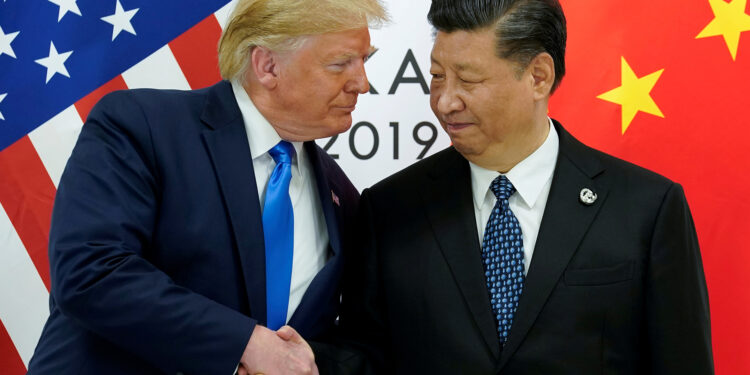Economic relations between China and the United States enter a new stage of tension after Beijing strongly responded to the American decision to impose new customs duties by 10% on Chinese exports, which prompted China to take reprisal measures that included investigations to combat monopoly, impose fees on American imports, and tighten restrictions Export on biological minerals.
According to a report published by the Economist, these steps are not just a retaliatory response, but rather an explicit warning of a more dangerous economic escalation that may develop into a comprehensive commercial war.
Counter -procedures
In a decisive response to the customs duties imposed by the administration of US President Donald Trump, China announced a series of counter -economic measures targeting major American companies and vital sectors, which threatens a new escalation in the trade war between the two largest economies in the world, the most prominent of which was:
- Anti -monopoly investigations against “Google”The Chinese government announced the opening of an investigation to combat monopoly targeting the American company “Google”, which may lead to restrictions on its work inside China, in a move that may constitute a major blow to one of the largest technology giants in the world.
- Insert American companies in the “Black List”China has officially included the “Illumina” company, which specializes in biotechnology, and “PVH”, which has global brands, such as Calvin Klein and Tommy Hilviger, within the “unreliable entities list”, which means imposing restrictions Strict on their investments and dealing with Chinese companies.
- Imposing restrictions on the export of rare mineralsBeijing announced that it will tighten export controls on the molybdenum and tingstin, two animal elements in the manufacture of electronics, defense equipment, and industrial components. It should be noted that China possesses 80% of the global production of Tingstin, which gives it a strong pressure card in the trade war.
- Imposing customs duties on American goodsAs of February 10, China will impose 15% customs duties on American coal and liquefied natural gas, in addition to 10% on crude oil, agricultural equipment, trucks, and large cars.
Does Chinese sanctions affect the American economy?
Although some of these measures may not cause widespread direct damage, it constitutes a strong message to the administration of President Donald Trump that China will not remain idle if the commercial escalation continues.
Economic analysts believe that rare mineral export restrictions may be among the most influential steps on American companies, as the United States relies heavily on these resources in technology and defense industries.
According to the analysts of the Peterson Institute for International Economy, the recent American fees will cost the US economy more than $ 100 billion between 2025 and 2040, even without a Chinese reaction.
Trump threatens more and China warns
Trump was not late in responding to the Chinese steps, as he stated in a speech at the White House that “China’s procedures will not remain unanswered, and we have expanded the scope of the fees soon,” in reference to the possibility of raising customs tariffs to 25% or imposing sanctions on more companies Chinese.
For its part, Beijing seeks to contain the escalation without retracting its positions, as economic experts believe that these measures are a “proactive blow” aimed at preventing Washington from imposing more sanctions.
Economist analysts believe that the real battle will be in April, when the US government’s review of China’s commercial practices will end on April 1, and the Trump administration may be used to reopen the file of intellectual property theft and violations of previous trade agreements.
Does the trade conflict extend to Europe?
It is not only limited to China, but the European Union may become the next goal for Trump, as the American president threatened to impose “huge fees” on European imports, on the pretext that the trade surpluses with the United States with the United States are “unfair.”
The President of the European Commission, Ursula von der Line, responded to Trump’s threats by saying, “We will defend our interests by all available means, and we will respond appropriately if necessary.”
It seems that the trade confrontation between the United States and China has entered a new phase of escalation, but the most important question now is: How long will this trade war continue?



